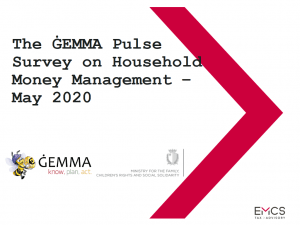ĠEMMA, government’s financial capability education platform, is carrying out a longitudinal study on Household Money Management within the context of the COVID-19 situation. The first report which surveys opinion in March and April 2020 is launched. The survey was carried out by EMCS. The survey finds:
- 83% in May (82% in April) of the general public feels that it is in control of their financial situation.
- Respondents with emergency funds for more than 3 months fell from 47% in April to 44% in May; whilst those with a fund between 2 and 3 months increased from 13% to 18%.
- Respondents that felt that their financial situation improved over the last month fell from 12% to 9% between April and May, and those who felt it remained the same increased from 53% to 59%.
- 19% in May felt that their financial situation will improve in the coming 3 months compared to 11% in April.
- Respondents who felt that ‘now’ is not the right time for major purchases increased from 16% to 35% between April and May.
- 50% of the respondents in May stated that they were not able to save over the last 3 months – previously 46% in April
- 55% of the respondents in both April and May expressed that they worry about their financial future.
- 26% of the respondents in May who hold a pension plan will consider increasing their retirement pot in the next 3 months when compared to April.
- The number of persons who expressed that they are more knowledgeable on money matters increased from 26% to 42% between April and May.
The survey shows that overall there is a positive shift on the management of household money matters between April and May. This is comes out strongly from responses relating to major purchases and pension planning – an increased readiness to spend on major purchases rather than saving for the longer term impact of COVID-19 and to plan for retirement rather than deferring funds for addressing the resulting here and now COVID-19 money impacts. Be that as it may, the number of respondents in who stated that they managed to save over the past 3 months increased from 46% in April to 50% in May,
There also seems to be a return in certain matters to pre-COVID-19 behaviour. With a more optimistic mode in May there is a marginal decrease in the need to having a rainy day fund: falling from 42% to 40%: as against strengthening of the money household reserves so that they are better prepared for future money management crisis.




